Disclosure: We may get commissions for purchases made through links in this post.
Optimizing the life and strength of an asphalt driveway often demands the correct density. But how thick should you make your asphalt driveway? We researched and consulted with niche experts for your convenience, and here’s what we found.
Asphalt driveways should be at least 2-inch thick. Surfaces with less than the recommended density can be prone to structural damage, particularly when trying to carry massive loads like construction equipment.
Take note that adding more thickness to an asphalt driveway won’t positively affect the surface’s serviceable life. Keep reading as we talk about the recommended thickness of asphalt driveways for residential and commercial uses in greater detail. We'll also discuss the difference between asphalt and concrete for you to gain additional insight into these materials.
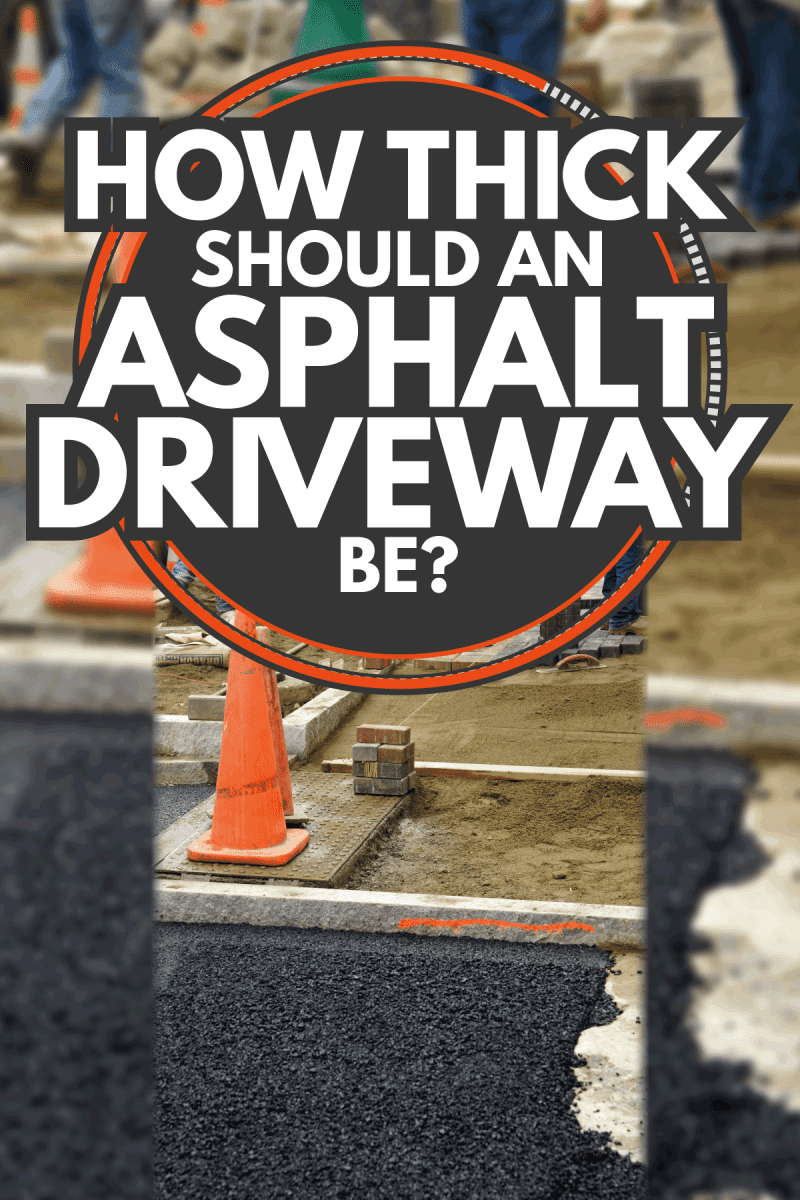
Is Asphalt A Blacktop Or Concrete?
Although closely associated with each other, ‘asphalt’ is an interchangeable term with ‘blacktop’ or ‘pavement.’ Colloquially, many communities accept substituting asphalt with blacktop. However, asphalt is different than concrete.
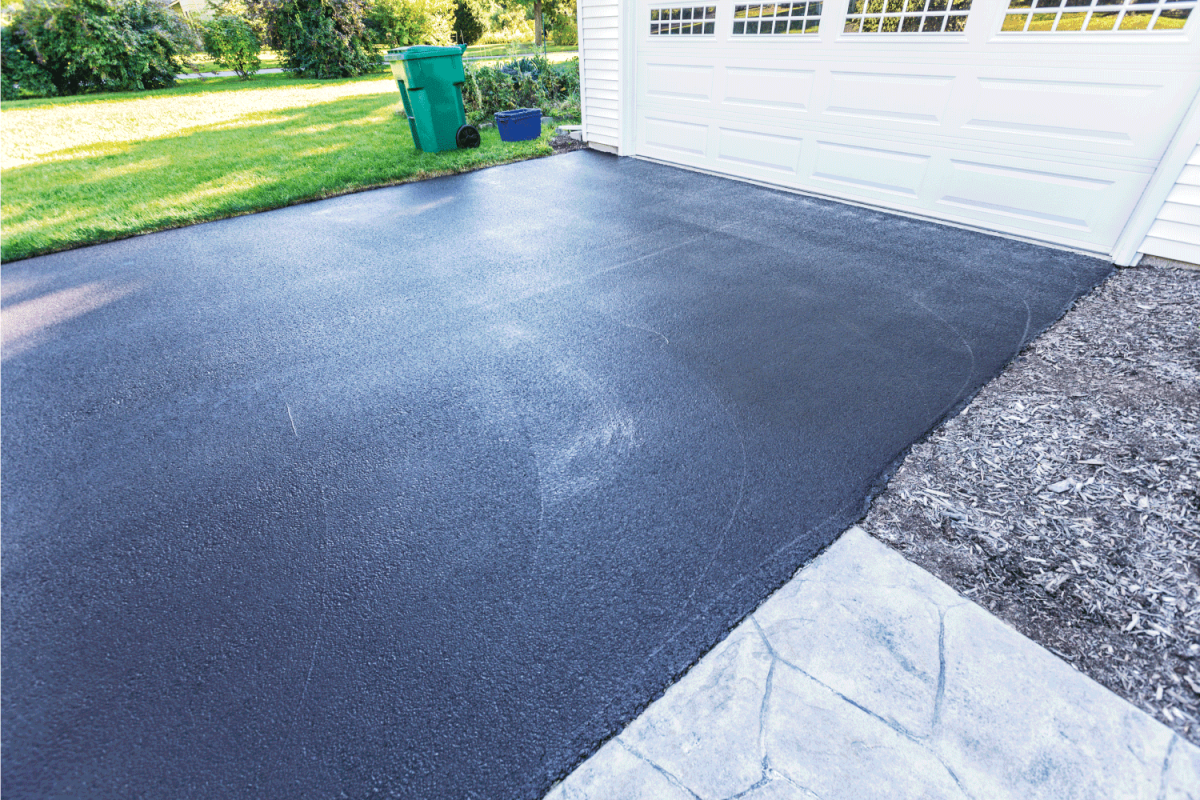
Asphalt
Asphalt is a combination of different ingredients, particularly aggregates, binders, and fillers, for building and maintaining structures like roads, driveways, and airport runaways. The aggregates used in creating asphalt can be substances like sand, gravel, and crushed rock.
Concrete
Concrete is a mixture of different materials with cement to seal the compound. Often used with sand and crushed stone, this composite can have different decorations to match visual themes. Moreover, concrete is generally more expensive than asphalt but might accrue cracks and gaps faster than asphalt.
You might also be thinking about the differences between a paver and an asphalt driveway. If so, read our post on that topic to know the answer.
What Is The Minimum Thickness For Asphalt?

Asphalt driveways should be at least 2 inches thick. At 3 inches, driveways made from this material should support large trucks and heavy construction equipment. But the assembly should have a 6- to 8-inch thick granular base aggregate. An asphalt path may not support fairly massive loads without this extra layer.
Commercial properties also generally require different thickness measurements for their asphalt driveways. Some of these requirements may include (but aren’t limited to) the following:
- The aggregate layer should be at least 8-inch thick
- Two 1.5-inch layers for the asphalt, with the first binder layer to include thick stone
- 2 or more inches of dense asphalt should be ideal for lots with heavy traffic
If you're also wondering about the recommended thickness for an asphalt parking lot, read our post on that subject to learn about that topic.
Does Thicker Asphalt Last Longer?
Adding extra layers of asphalt or blacktop won’t make a significant difference to its serviceable life. It’s ideal to think about the blend of the compound material to enhance its life.
Take note that different asphalt variants will have dissimilar amounts of gravel, sand, and other components, which can positively or adversely affect a driveway’s usefulness.
It’s best to consult with contractors to know the correct asphalt blend to match your needs. Get a second or third opinion if you and your contractor have conflicting views.
Check out this pre-mixed asphalt repair on Amazon.
How To Install An Asphalt Driveway?
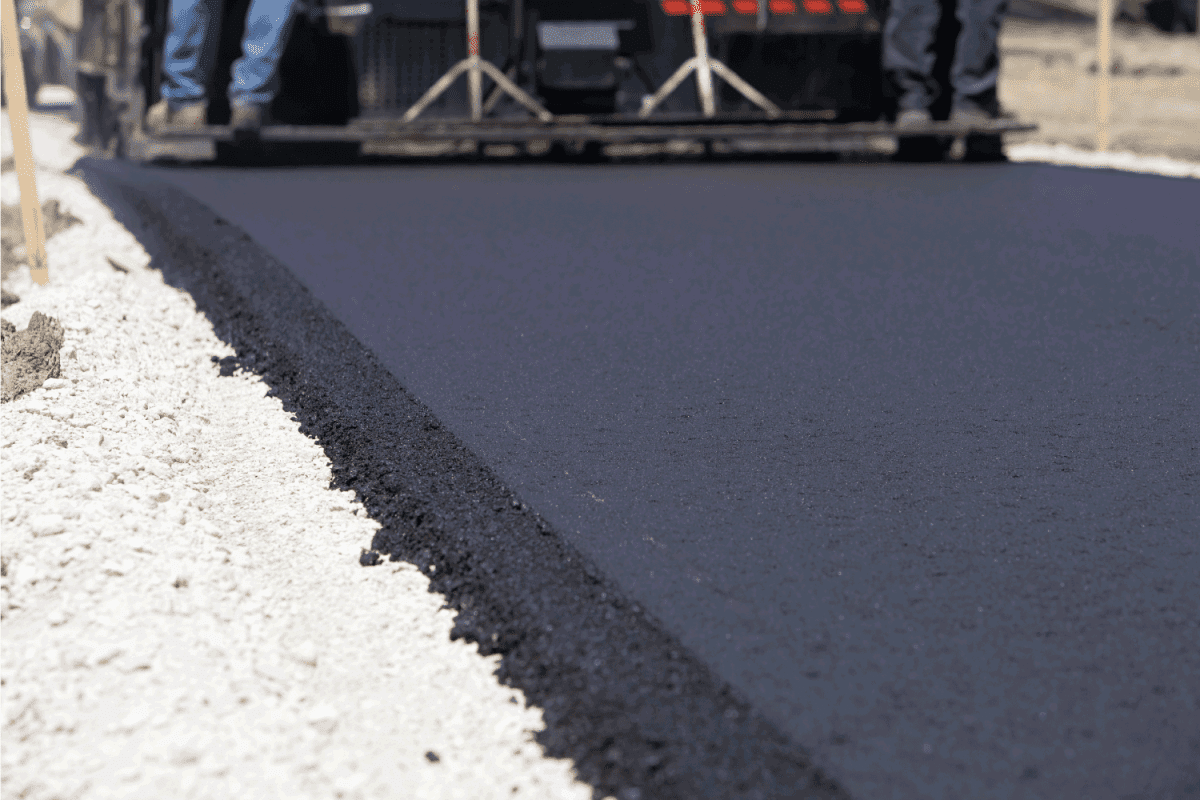
Installing an asphalt driveway can be an expensive and laborious job if done with DIY techniques. Help from certified professionals is generally the best way to deal with this undertaking. Experts in this field should have sufficient experience, knowledge, and skill in taking into account the project’s different elements to prevent costly mishaps.
However, if you want to proceed with this task, your first step is to prepare the sub-grade. Ensure that the ground that’s going to be beneath the asphalt driveway is as dense, compact, and flat as possible for the surface to handle the weight of heavy objects.
Then, excavate the soil and fine-grade it to provide proper water drainage. Failure to do complete these preparations may result in pools of water forming after rain, resulting in standing water and other moisture-related issues.
Also, remove all sand, gravel, stone, and other debris before installing the asphalt. A good rule of thumb to follow is to remove anything that moves from the sub-grade if those objects budge with the feet.
The final step of the preparations is to apply herbicide to the sub-grade. Weeds and other plants growing from the soil underneath the asphalt can push through the driveway, causing cracks and holes.
After finishing the preparations, follow these steps to install the asphalt for the driveway:
What You’ll Need
- Asphalt paving machine
- Asphalt rake
- Compactor
- Caution tape or traffic cones
Check out this asphalt rake on Amazon.
Step-by-Step Guide
- Use an asphalt paving machine to lay down the asphalt over the sub-grade. Don’t install asphalt by hand for human error can promote an uneven finish.
- Take out the leftover debris from the installation with an asphalt rake.
- With the asphalt compactor, apply heated pressure to the newly installed driveway. Don’t waste too much time before doing this step. Otherwise, it can be more challenging to compact dry asphalt as opposed to when the material is still fairly wet.
- Place caution tape or traffic cones to tell passersby not to step or go through the newly installed driveway until it cools completely.
Be careful when laying down asphalt. This material is quite hot, which requires installers to wear heat-resistant clothing like durable boots and long-sleeved clothing to prevent skin damage.
Also, you can watch the video below to learn more about how to install an asphalt driveway correctly:
What Are The Three Types Of Asphalt?
The different asphalt variants can usually be under these three primary types:
Hot Asphalt
Generally used in creating driveways and paths, hot asphalt can also be a great solution for patch jobs. It’s a permanent solution to different road problems but requires careful planning and installation to prevent different issues from surfacing.
UPM
UPM cold mix comes from a company called Unique Paving Materials. Like hot asphalt, the UPM option can also be an ideal solution to help fix different asphalt or concrete problems. It generally also has better weather resistance than other asphalt types.
MC Cold Mix
As its name implies, MC cold mix asphalt doesn’t usually require hot temperatures to set and cure. Its properties make it ideal for quick patch jobs. However, MC cold mix often doesn’t last as long as its hot counterpart. Nonetheless, it has traits that can offer unique benefits, such as its inherent ability to maintain its structural integrity while stockpiled.
What Makes A Good Asphalt Driveway?
An asphalt driveway should carry a heavy load without giving into the massive weight. Property owners should think about the following elements to ensure their driveways made with this material provides optimal practicality.
Strong Foundation
Like residential and commercial establishments, asphalt driveways without strong foundations can crumble under pressure. For example, being unable to compact a soft-grade soil can make the asphalt buckle under heavy traffic.
The Right Materials
Commercially-prepared asphalt is available for interested customers to purchase. But for those that want to mix their own asphalt batches, you should use the correct components bearing ideal consistencies to produce idyllic mixes.
Suitable Drainage
Standing water on asphalt can deteriorate asphalt sooner than later. With proper drainage, water should flow out of the driveway to prevent the material’s fast deterioration and extend the surface’s practical life expectancy.
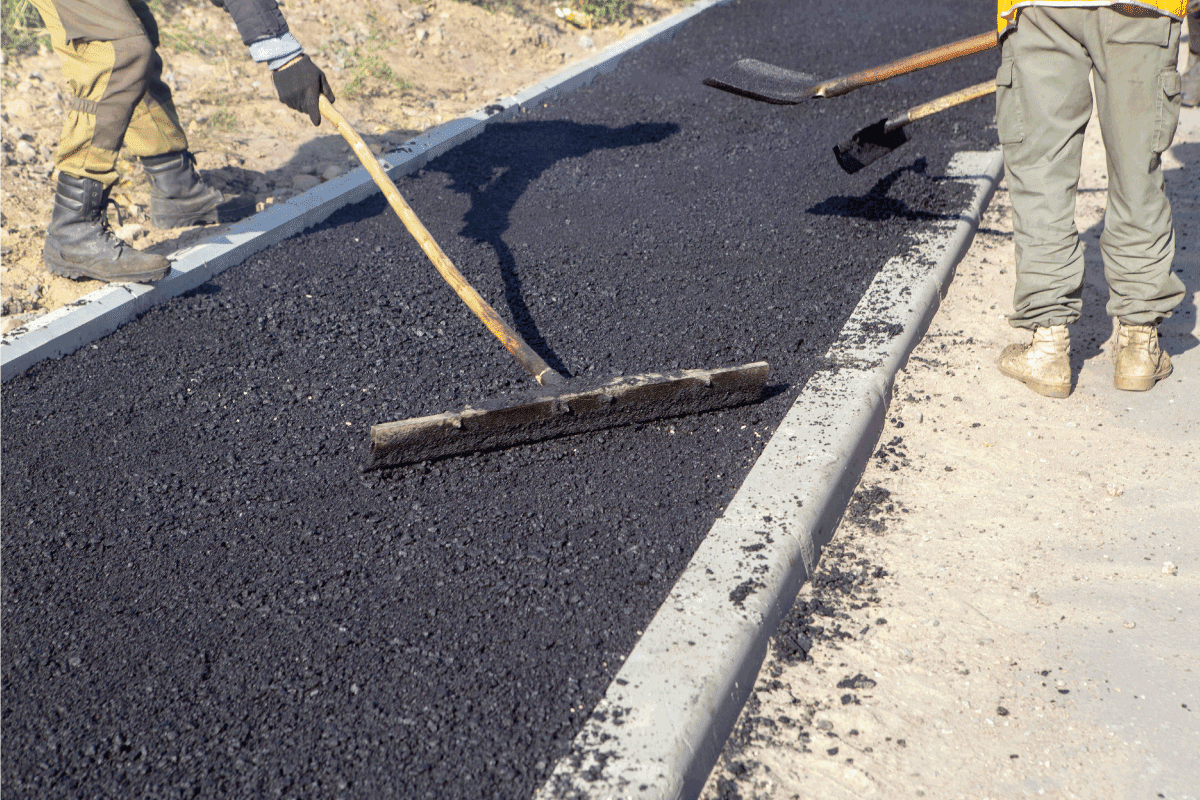
Final Words
A residential asphalt driveway should have a thickness that doesn’t go below 2 inches. Driveways for commercial spaces will usually demand thicker asphalt driveways to supply the ideal longevity and strength to carry heavy loads. Failure to follow the recommended thickness can lead to costly issues, such as cracks and holes in the blacktop.



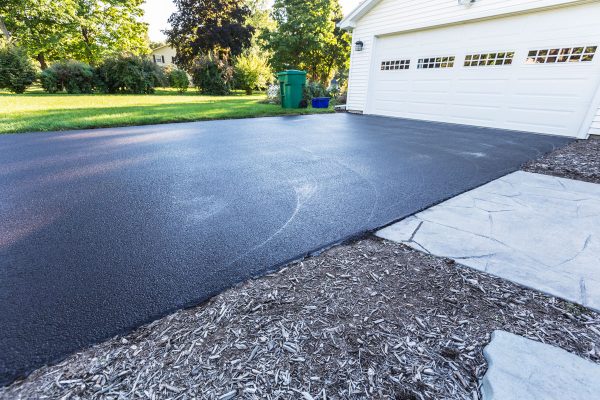
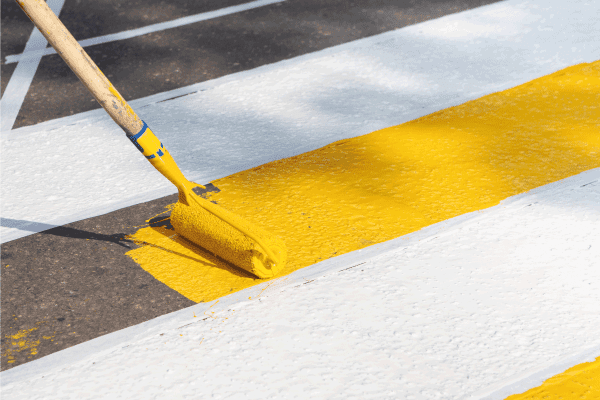
![Two manual workers helping to level the asphalt surface for a steamroller to press, Types Of Asphalt [And How To Choose For Your Driveway Or Walkway]](https://pavingplatform.com/wp-content/uploads/2022/03/Two-manual-workers-helping-to-level-the-asphalt-surface-for-a-steamroller-to-press-600x400.jpg)